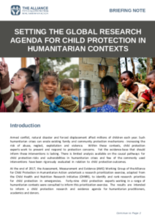Armed conflict, natural disaster and forced displacement affect millions of children each year. Such humanitarian crises can erode existing family and community protection mechanisms - increasing the risk of abuse, neglect, exploitation and violence. Within these contexts, child protection experts work to prevent and respond to protection concerns. Yet the evidence-base that should inform these interventions is lacking. There is limited analysis available on the causal pathways for child protection risks and vulnerabilities in humanitarian crises and few of the commonly used interventions have been rigorously evaluated in relation to child protection outcomes.
At the end of 2017, the Assessment, Measurement and Evidence (AME) Working Group of the Alliance for Child Protection in Humanitarian Action undertook a research prioritization exercise, adapted from the Child Health and Nutrition Research Initiative (CHNRI), to identify and rank research priorities for child protection in emergencies. Forty-nine child protection experts working in a range of humanitarian contexts were consulted to inform this prioritization exercise. The results are intended to inform a child protection research and evidence agenda for humanitarian practitioners, academics and donors.
This Briefing Note outlines the priority areas for the Global Research Agenda, laid out by the Assessment, Measurement and Evidence (AME) Working Group of the Alliance for Child Protection in Humanitarian Action. Research priorities include: cash transfers, family strengthening, serving children with disabilities, engaging the social service workforce in humanitarian settings, and more. The document also outlines the methods and criteria for research.

